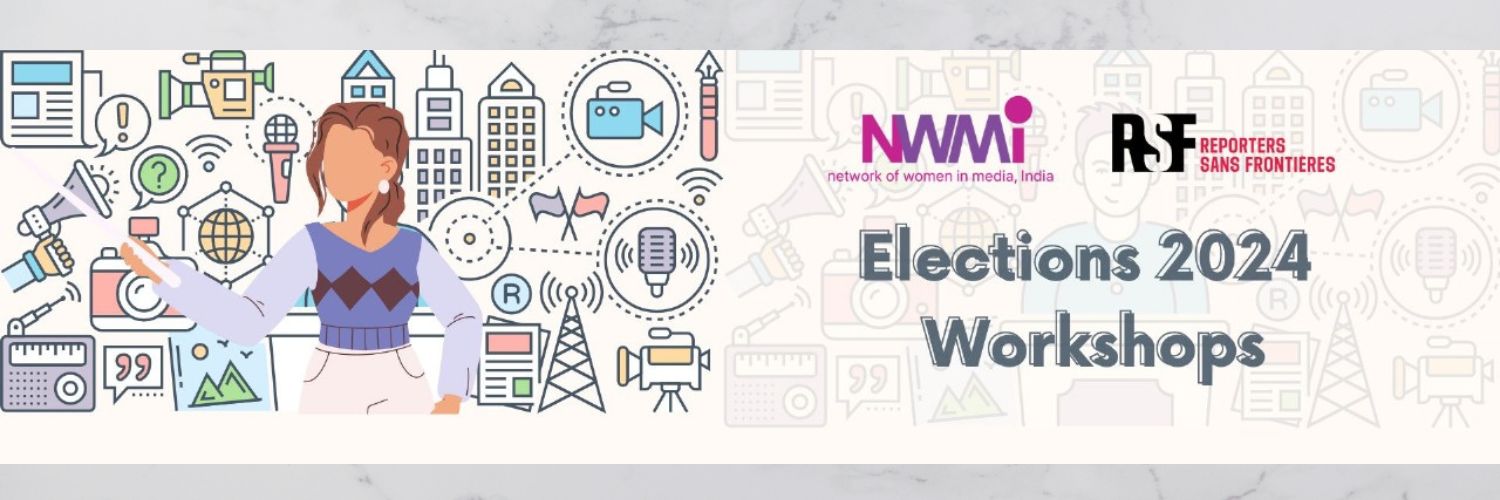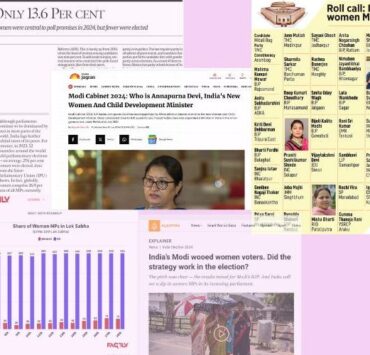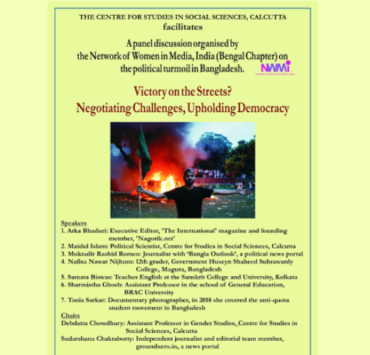
By Vatsla Srivastava

Earlier this year, the Network of Women in Media, India (NWMI) joined forces with Reporters Without Borders (RSF) to hold a series of powerful workshops for women journalists. This five-part program, held online in April and May 2024, aimed to equip nearly 60 participants with the skills they need for better election reporting.
Workshop Series
The workshops covered a wide range of topics, from incorporating a gender lens into reporting to using data to tell compelling election stories. Here’s a quick rundown:
Covering Elections from the Gender Perspective (April 7): This session, led by Bhanupriya Rao, founder of Behan Box, and her team, showed participants how to analyze election manifestos, explore women’s participation in elections, and hold governments accountable for policies that impact women. Priyanka Tupe from Behanbox emphasised that “There is no alternative to ground reporting. People can do armchair reporting because someone has done the legwork.” Afterwards, independent journalist Sameera Khan praised the NWMI-RSF-Behanbox collaboration, saying, “Each person who presented was excellent. I loved how you dissected policies with a gender lens and the session on disseminating stories through collaborations and translations – it’s so important to get out of our echo chambers.”
Watch the recording here:
Elections x Gender | NWMI x RSF Workshop
Elections & Gender Through A Solutions-Lens: Building an Inclusive and Complete Narrative (April 13-14): Swati Sanyal Tarafdar, an independent journalist and trainer, conducted this two-day workshop on solutions journalism and how to apply it to elections. Participants learned to identify stories that focus on solutions, report on these stories in a way that includes everyone, and promote accountability. Participant Arunima Kar, a multimedia journalist who participated in the workshop reflected that “Solutions journalism isn’t just about positive stories. While solutions are essential, acknowledging limitations is equally important for a comprehensive understanding.”
Watch the recording here:
Elections x Solutions | NWMI x RSF Workshop
Part 1:
How to Tackle Misinformation/Disinformation During Elections (April 20): Dr Ruchi Tewari from MICA and Urvashi Kapoor from Jagran New Media, demonstrated methods to fact-check information, including audio and video content. They also introduced participants to AI tools that can help identify misinformation and techniques for detecting fake videos.
“Future collaborations should focus on practising critical thinking, leveraging digital verification tools, and even creating fake news – to fully understand the ease and motivations behind misinformation,” said Dr. Ruchi Tewari. “This will better equip journalists to stay vigilant against the spread of fake news.”
Watch the recording here:
Elections x Misinformation | NWMI x RSF Workshop
Audio and Video Storytelling for Elections (April 27): Anubha Bhosle, Founder of Newsworthy Studios, an initiative under Sumud Media, led this workshop on using audio and video to create powerful election stories. Participants learned about the basic tools, different creative formats, and methods to edit quickly.
“The need of the hour is more consistent training with journalists on reporting styles, how to include more rigour, how to experiment with formats and storytelling, how to keep their information safe, and especially for independent and freelance journalists – on how to sustain themselves in tough media environments,” said Anubha Bhonsle.
Watch the recording here:
Elections x Multimedia | NWMI x RSF Workshop
How to Cover Elections Using Data (May 4): John Samuel Raja, co-founder of How India Lives conducted this day-long session on the use of data journalism for election reportage. Participants learned how to find election-related data, analyse, visualise and present it in a way that’s easy to understand. According to Raja, “Improving data skills requires more than just short-term training. The best approach is to create a framework for longer-term engagement, including mentorship and refresher sessions, so participants can repeatedly use and integrate data analysis into their daily reporting,” said the organisers.
Watch the recording here:
Part 1:
Part 2:
The Impact
This NWMI-RSF collaboration was very positively received. “The training empowered women journalists with essential tools and techniques, enabling them to cover elections and politics more comprehensively,” said Swati Sanyal Tarafdar, Solutions Journalist Trainer and Freelance Journalist specialising in Social and Climate Justice. “It equipped them with deeper interview methods, nuanced storytelling, and the ability to amplify marginalised voices and diverse perspectives.” Amitha Balachandra, a freelance journalist with RSF and NWMI Coordinator for the initiative said, “Overall, it was extremely gratifying to see the sessions come through – right from planning to execution, this was also my first activity for NWMI and as a new member of the group. I could not have asked for a better start.”
A big shout out to NWMI members who made the workshop happen: Amitha Balachandra, Ayswarya Murthy, Vatsla Srivastava, Swati Sanyal Tarafdar, and Meera K Desai for their efforts.
Vatsla Srivastava is a journalist turned development sector professional and a member of the NWMI working at the intersections of public policy, gender justice, and strategic communications.
Edited by Nisha Susan




